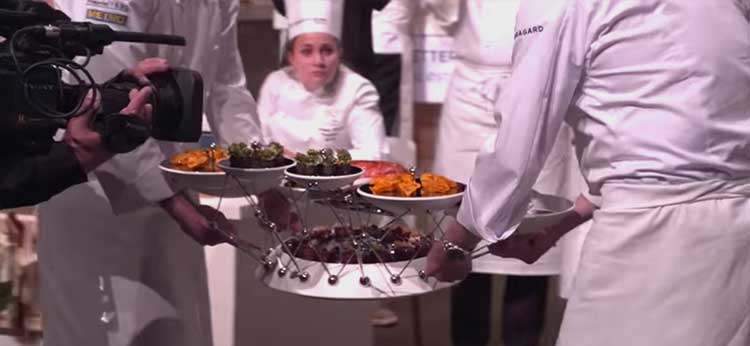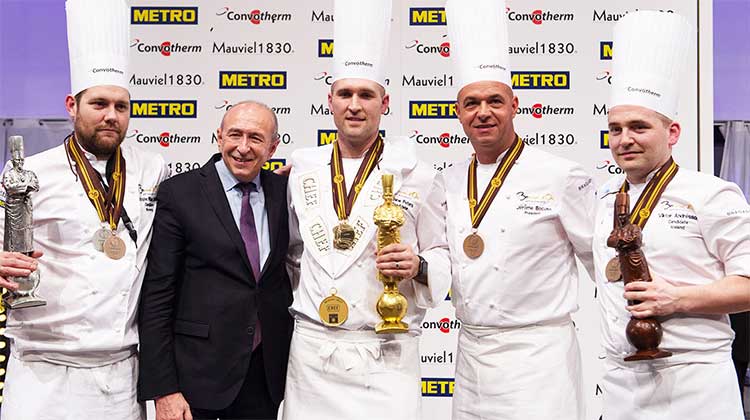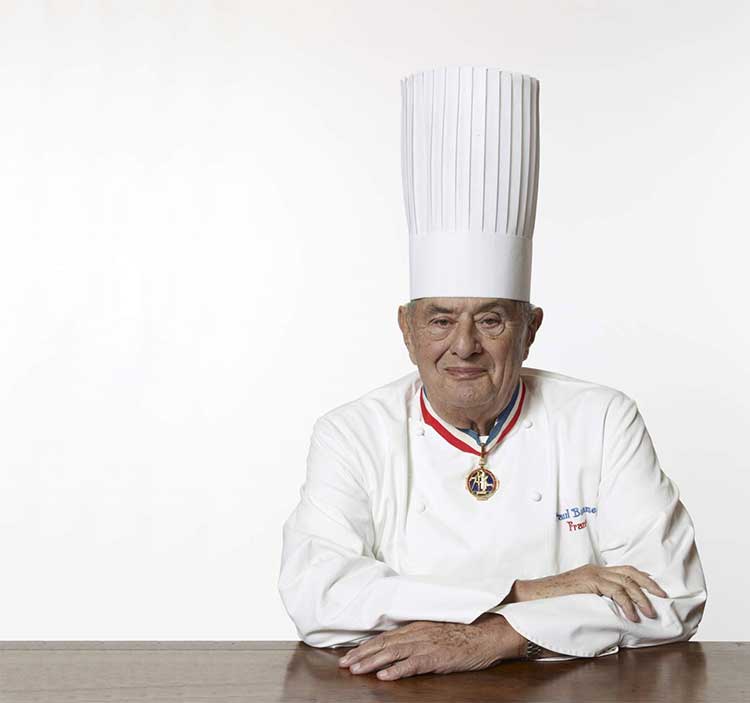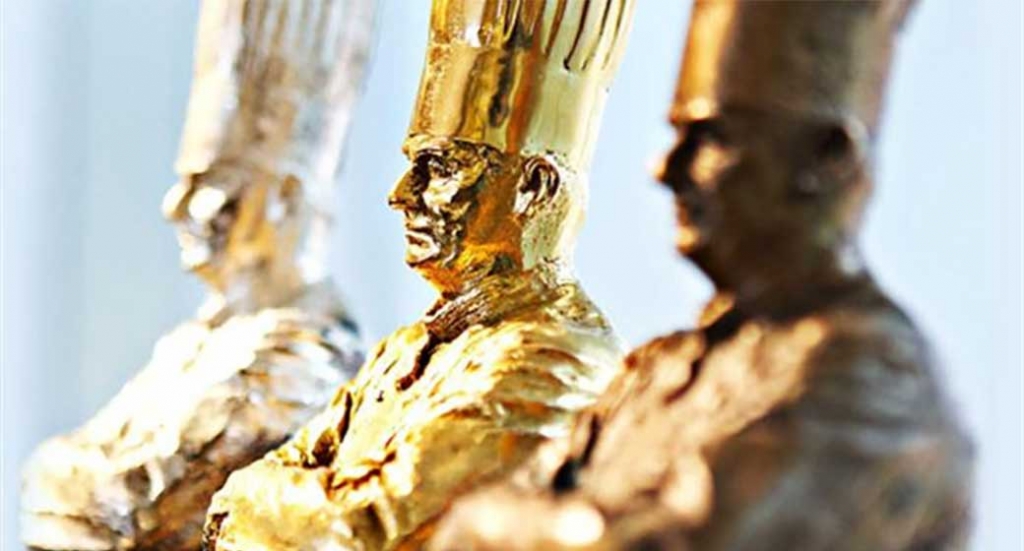In short, the Bocuse d’Or is basically the Olympics of Cooking (although another competition more officially claims that title). For many, the Bocuse d’Or is the most prestigious international cooking competition in the world. And it kicked off this week in Lyon, France with 24 chefs from around the globe competing to take home the gold.
Early History
It was the brainchild of super chef, Paul Bocuse. Chef Bocuse was the honorary president of a Culinary Sector Exhibition and Trade Fair held in Lyon in 1983. He felt that a live cooking competition would be a benefit to the show. And while there were already many cooking competitions held around the world, Chef Bocuse wanted to do something a little differently.
In most cooking competitions at the time, the actual work of the chefs was done out of sight. It was only the end result that was judged. Chef Bocuse envisioned a competition where the preparation was done in full view. And in many ways, Chef Bocuse is the spiritual godfather of all the reality cooking shows we see on TV today.
The Bocuse d’Or was first officially held in 1987 and is only held every other year (as opposed to every 4 years like the Olympics). The trade show had been renamed as the Salon international de la restauration de l’hôtellerie et de l’alimentation. Or SIRHA, for short.

The Competition
With the competition held in full view, audiences soon became an integral part of the show. Often loud and boisterous, the atmosphere has been compared to a soccer match complete with noisemakers and even bands from contestants home countries on hand to cheer them on.
But it’s not just a circus. This is a serious competition of cooking skills by some of the world’s finest chefs.
Around the world, qualifying events are held to determine which 24 countries will be selected to compete in the Bocuse d’Or finals.
Each country is represented by a lead chef and his commis or assistant. Interestingly, the commis must be under 22 years of age at the time of the competition.
Each chef is given 5 hours and 35 minutes to create two elaborate dishes: a meat dish and a fish dish. Beginning in 2009, the rules were changed to also allow a coach to be on hand to communicate with the chef team. However, the coach is not permitted in the kitchen area.
There have been a few other rule changes in recent years as well. The most significant of these has been a change in the presentation format. In years past, the chefs prepared a large tray presentation. This allowed for some amazing and fantastic displays but strayed pretty far from what chefs typically do in your average restaurant.
So in 2013, the rules were changed to require the chefs to prepare 14 individual plates. This change was made to try to bring the final presentations closer to what would actually be done in a real restaurant.

Judging & Prizes
The contestants are judged by a panel of 24 judges. The judges represent some of the most famous and acclaimed personalities in the international culinary community. Past judges have included celebrity chefs such as Wolfgang Puck and Thomas Keller.
The judges are split into two groups. One group judges the meat dishes while the other half judge the fish dishes. Judging is done on a point system. The chef teams are judged on the quality of the food as well as the presentation. However, the food quality definitely counts for more, making up two-thirds of the overall score.
In case of a tie, additional points may be awarded for things such as teamwork and cleanliness.
In the end, the team with the highest point total is the winner. Like the Olympics, teams compete for gold, silver and bronze. The trophies are statues of founder Paul Bocuse in his full chef regalia.
In addition, there are cash awards for the winners. And there are a number of specialty side awards for things such as best fish and meat dishes, best cultural representation and best apprentice.

Winners Past & Present
Unsurprisingly perhaps, French chefs have taken home the gold the most times since the initial Bocuse d’Or in 1987. French chefs have won 7 golds. But Norway is close behind, winning the gold 5 times. France is also the only country to win back-to-back golds.
The United States of America has only won once in 2017, which makes the US the defending champions for this year’s competition in 2019. The Americans finished with silver in 2015 but had never medaled prior to that.
Belgium might have a case to win the “always a bridesmaid, never a bride award.” They have won 6 medals over the years, but have never taken home the gold.
For the 2019 Bocuse d’Or, it was a Scandinavian sweep! Denmark, Sweden and Norway finished with gold, silver and bronze respectively.
Congratulations to the winning chefs Kenneth Toft-Hansen and his commis Christian Wellendorf Kleinhert. Kleinhert also won the Best Commis award. Excellent work!

Paul Bocuse
The founder of the Bocuse d’Or, Paul Bocuse passed away in January of 2018 at age 91. He had been suffering from Parkinson’s Disease for some time. Interestingly, Bocuse died above his restaurant L’Auberge du Pont de Collonges (sometimes referred to simply as Bocuse). This was also the same house in which he was born in 1926.
Bocuse was known as a gifted culinary teacher and practitioner of the culinary arts. He was one of the chefs selected to create fancy meals for the newly created Concorde jet in 1969.
The Culinary Institute of America named Bocuse the “Chef of the Century” in 2012. But the Bocuse d’Or competition, the unofficial world championship for chefs, will likely be Chef Bocuse’s enduring legacy for the culinary world.
The 2019 Bocuse d’Or was the first to be held without its namesake. We will miss you Chef Bocuse!



